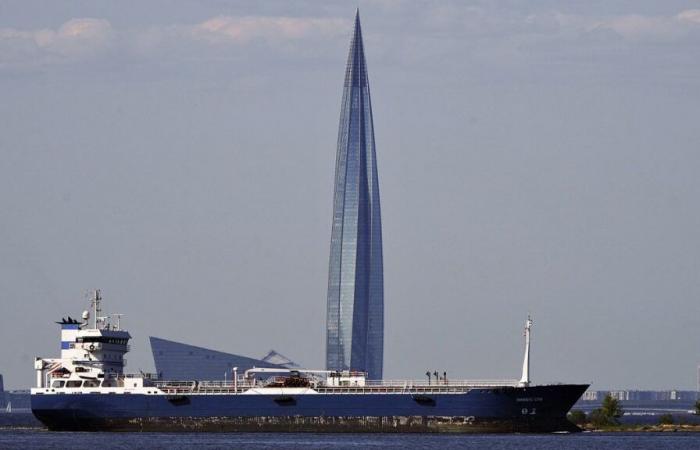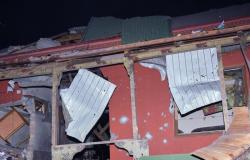The 27 EU member states have up to 2027 to end the use and purchase of Russian energy. A decision by Brussels, which concerns in particular the cargoes of liquefied natural gas (LNG) which continue to arrive on the coasts of the European Union, despite the war that rages in Ukraine and the numerous sanctions already applied.
This stop will be gradually. At first, new short -term contracts will be prohibited by the end of 2025. In a second step, long -term contracts will be terminated by the end of 2027. Other restrictions will also be introduced to combat the clandestine fleet which secretly carries Russian oil and to end the imports of Russian uranium and other nuclear materials.
Each Member State will be invited to develop a national plan detailing how it intends to eliminate the Russian gas, nuclear and oil from its energy bouquet.
All these measures are part of a strategy global presented by the European Commission Tuesday afternoon. The roadmap, which must be materialized by legislative texts before entering into force, was initially awaited in the first hundred days of the new commission, but it was postponed several times due to the uncertainty linked to the will of Donald Trump to launch negotiations between Ukraine and Russia.
The resumption of Russian energy purchases has been mentioned as a possible condition to achieve a future peace agreement. With its strategy, Brussels excludes this controversial idea and implemented the necessary guarantees so that the Russian fossil fuels belong definitively to the past.
“Even if peace reigned tomorrow, it would not be reasonable that we returned dependent on the Russian fuels”said Dan Jørgensen, European Commissioner responsible for energy.
“Above all, (Vladimir) Putin showed that he did not hesitate to use gas for military purposes. We should not put ourselves again in such a position of vulnerability. Second, we do not want to fill his war treasure and support his war economy, because who knows which countries will be the next ones?“He added.
Russian energy consumption has been at the heart of the political debate since the start of the invasion, when the EU was suddenly forced to take into account its dependence on Moscow, which amounts to billions of euros. In response, Brussels has approved unprecedented measures to reduce Russian coal and oil imports, but gas, which constitutes an important source of income for the Kremlin, was manifestly spared by the sanctions.
last year, the European Union bought 31.62 billion cubic meters of Russian gas per gas pipeline and 20.05 billion cubic meters of Russian LNG, which represents 19 % of total gas consumption. At the same time, Russian crude oil continued to pass through the Druzhba oil pipeline, which was exempt from sanctions due to pressures exerted by Hungary.
In total, the EU spent around 23 billion euros for Russian fossil fuels in 2024, which exceeds the military support provided to Ukraine. This imbalance has long been a source of friction between the Member States which, despite the incessant calls for kyiv, have never managed to find a consensus to completely eliminate Russian energy.
At the beginning of the year, ten EU countries – the Czech Republic, Denmark, Estonia, Finland, Ireland, Latvia, Lithuania, Poland, Romania and Sweden – signed a common letter requiring a total ban on Russian gas, including imports from LNG. “Russia’s ability to support its war efforts is deeply linked to its energy income”they write.
On the other hand, Hungary and Slovakia have climbed the ranks to oppose sanctions, arguing that this would jeopardize their national economies and the competitiveness of the EU.
The two landlocked countries were furious When Ukrainian President Volodymyr Zelenskyy decided to terminate the contract with Gazprom and stop the transit of Russian gas by his country at the end of 2024. “We will not allow them to earn additional billions on our back”said Zelenskyy said last December.
Budapest and Bratislava asked Brussels to intervene, but the Commission refrained from criticizing Mr. Zelenskyy’s decision, since it helped to accelerate this progressive elimination of Russian gas.
-The judgment made Turkstream, which crosses Turkey to the Balkans and Central Europe, the only gas pipeline actively transporting from Russian gas to the European Union. The flows passing through the Nordstream and Yamal-Europe pipelines have ceased during the first year of the war.
“The prohibitions provided for by the plan will be adopted by qualified majority. Unlike sanctions, which require unanimity”said Mr. Jørgensen.
“We expect from all countries that they respect the law, even if they do not agree with the decision “.
A political puzzle
While Russian gas purchases by gas pipeline have reached historically low levels, ships carrying Russian LNG continue to enter the European Union terminals to even higher volumes, without any hindrance, which constitutes a political puzzle for Brussels.
According to the energy and pure air research center (CREA), Russian LNG imports in the EU in 2024 increased from 9 % compared to the previous year. Almost 90 % of these purchases arrived in France (7.7 billion m3), Spain (5.7 billion m3) and Belgium (5.1 billion m3).
“Russia depends a lot on the EU market for its gas exports, which represent 52 % of its LNG export revenues”, said CREA in a report published in April.
The absence of restrictions has enabled European companies to freely sign contracts with Russian suppliers, some of which run until 2040.
According to the commission project, despite the ban on buying Russian gas, EU companies will be able to declare a case of force majeure – that is to say events or circumstances that escape the control of signatories – to emerge from their legal commitments.
“They cannot therefore be held responsible. It is the clear evaluation of our legal services. We therefore think that our message is very reassuring for the companies that have signed these contracts“Said Mr. Jørgensen.
However, this option may be challenged in court and cause heavy penalties for Europeans. Russian contracts are generally governed by clauses “take-or-pay” Well defined, which means that buyers are forced either to take the agreed deliveries, or to pay financial compensation for their refusal. According to Reuters, disputes between European companies and Russian suppliers already amount to 18.5 billion euros.
The most effective method for invoking force majeure and challenging legal proceedings would be the acceptance of sanctions at the EU level, explains Elisabetta Cornago, researcher at the Center for European Reform (CER), who admits that the positions of Hungary and Slovakia make the thing theoretically impossible.
“The new roadmap of the Commission recognizes this difficulty, but is trying to find new paths to technically reach a progressive elimination of imports of Russian fossil fuels, as for example by providing contracts to contracts to European companies”a déclaré mme cornago to Euronews.
“This is not without risk, because expensive arbitrations could ensue for these companies, but it is a way to move forward and point out that the EU takes (finally) seriously the progressive elimination of all imports of Russian fossil fuels”.
The presentation of this Tuesday comes in a particular context marked by the commercial negotiations between the Commission and the White House. Donald Trump launched the idea of increasing LNG sales made in the United States in order to rebalance the surplus of goods with the European Union.








